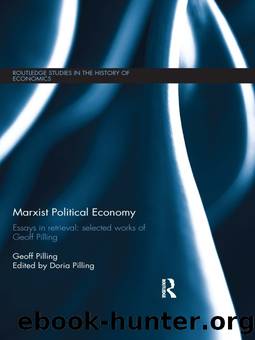Marxist Political Economy by Pilling Doria Pilling Geoff

Author:Pilling, Doria, Pilling, Geoff
Language: eng
Format: epub
Publisher: Taylor and Francis
(Keynes 1936: 245)
Elsewhere Keynes writes that he takes as given (that is, as fixed) the entire âeconomic frameworkâ of capitalism (Keynes 1936: 246).
Now, of course, the fact that Keynes took these factors as âgivenâ does not mean that he was innocent of the fact that, in the empirical sense, this was not the case. A far more serious issue is involved here. It reveals the fact that Keynesâs work involved the conventional and essentially positivist process of modelbuilding whereby, on the basis of a series of arbitrary assumptions, a model of the economy is constructed. That is, Keynes makes a series of assumptions in order to simplify the analysis of the economy â such that there is no technical change taking place, that the âeconomic frameworkâ of capitalism is fixed â and on the basis of these abstractions a coherent picture of the world is derived. But, as in the case of the traditional assumption of perfect competition, such abstractions are purely mental devices having no basis in the reality of the phenomena being investigated. And precisely because of this they must be arbitrary and subjective. Marxâs analysis is of course based on abstractions (âIn the analysis of economic forms, moreover, neither microscopes nor chemical reagents are of use. The force of abstraction must replace bothâ Marx 1961b: 8) but his are abstractions of a quite different order, reflecting as they do the real movement of capital. (For an excellent exposition of Marxâs method of abstraction in Capital and the difference between his procedure and that employed by positivism, see Ilyenkov 1982.)
For Marx all real economic categories â capital, value, rent, interest, profit, etc. â reflect not a series of arbitrary mental assumptions but definite social relations of production. Consequently, they are not categories valid for all epochs and all societies. Let us take the example of capital. According to Marx, capital is no mere thing â raw materials, buildings, factories, etc. â but a social relation which finds expression in or attaches itself to many different things such as money or commodities. The central feature of capitalism, its specifica differentia , the quality which marks it off from past economic systems, is that the means of production are monopolised by a class and face another class, the working class, which is obliged out of necessity to sell its ability to work (in Marxâs terminology, its labour power) to one or other owner of capital. This is why for Marx the essence of capital lies in the fact that it is a social relation and not merely a material thing. Just as the examination of a sack of wheat cannot disclose the social relations under which it was produced (in a feudal demesne, by slave labour, on a collective farm, etc.) so the natural properties of the means of production can never tell us whether they function as capital. A certain class of people may own things such as factories, financial assets and so on but only a definite social
Download
This site does not store any files on its server. We only index and link to content provided by other sites. Please contact the content providers to delete copyright contents if any and email us, we'll remove relevant links or contents immediately.
Pale Blue Dot by Carl Sagan(4003)
The Rules Do Not Apply by Ariel Levy(3906)
Goodbye Paradise(2964)
Delivering Happiness by Tony Hsieh(2922)
Liar's Poker by Michael Lewis(2812)
Into Thin Air by Jon Krakauer(2703)
Purple Cow by Seth Godin(2698)
Ogilvy on Advertising by David Ogilvy(2683)
Rogue Trader by Leeson Nick(2474)
The Airbnb Story by Leigh Gallagher(2372)
The Social Psychology of Inequality by Unknown(2311)
The Mind Map Book by Tony Buzan(2083)
Six Billion Shoppers by Porter Erisman(2001)
Bossypants by Tina Fey(1987)
All the President's Men by Carl Bernstein & Bob Woodward(1962)
Claridge's: The Cookbook by Nail Martyn & Erickson Meredith(1962)
Master of the Game by Sidney Sheldon(1881)
Alibaba by Duncan Clark(1755)
Wild Ride by Adam Lashinsky(1659)
